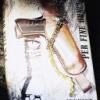Well, of course, reading those last two lines stopped me dead in my tracks... because I think we all recognize them from You Only Live Twice, the novel, listed there as Bond's "philosophy". If Fleming had been a closet London fan, I had never heard of it.I would rather be ashes than dust!
I would rather that my spark should burn out in a brilliant blaze than it should be stifled by dry-rot.
I would rather be a superb meteor, every atom of me in magnificent glow, than a sleepy and permanent planet.
The function of man is to live, not to exist.
I shall not waste my days in trying to prolong them.
I shall use my time.
This quotation, called London's "Credo", is taken in this form from an introduction by Irving Shepard, London's step-nephew, to a 1956 collection of short stories entitled Jack London's Tales of Adventure. It would seem to be in this poetical typesetting that Fleming first encountered these words, but a slightly different version (actually, the only other complete version) appeared even earlier, in a December 1916 article by Ernest J. Hopkins, published just weeks after London's death; I'll let Clarice Statz, a London scholar, take over from here (she quotes Hopkins' article at the start; the bolding is my own):
In my opinion, the phrasing of the fragment featured in YOLT is too close to be from anyone but London; Fleming obviously encountered Shepard's London collection sometime after its 1956 publication, and found it appropriate -- in fact, it is probably the perfect expression of London's, Fleming's, and Bond's life philosophies."'I would rather be ashes than [sic] said Jack London not two months before his death, to a group of friends with whom he was discussing, as he loved to discuss, the eternal problems of life and living.
'I would rather be ashes than dust.' The words, with their strange double significance, are now recalled with emotion by those friends. When he made that striking summary of his personal philosophy, London was marvelously alive. He irradiated vigor. Every breath that he drew was to him a brilliant sensation. Every moment of his time was crammed with events. he was in love with life--an[d] with vitality--ablaze with the joy and the poignancy and the overwhelming interest of "The Game."
Let there be no misunderstanding of his phrase. Jack London did not mean to say that, after death, he would prefer the ashes of cremation to the dust of ordinary burial. Nothing was further from him than the thought that he himself was, as he put it, soon to 'go into the silence.' Of all the ardent group that heard him on that occasion, he was the most alive. Beside him all other men seemed colorless. But he was talking about life, not about death. He was giving his law of conduct, not his preference in funeral customs.
'I would rather be ashes than dust. I would rather that my spark should burn out in a brilliant blaze than that it should be stifled by dry-rot. I would rather be a superb meteor, every atom of me in magnificent glow, than a sleepy and permanent planet. The proper function of man is to LIVE. I shall not waste my days trying to prolong them. I shall use my time.'
'I would rather be ashes than dust.' In those words London perfectly expressed himself. Never content to do his thinking by halves, upon that instinct for supreme activity he constructed a philosophy that was consistent, if unusual. Absorbed in today, he could not envisage a hereafter. Enthusiastic over tangible facts and present sensations, he believed that ease was cowardice; that the stronger must over conquer the weaker; that intellectuality divorced from action was wasted an futile; that man and the animals were of one nature, man having no quality that was not rudimentarily present in horses and dogs; that after death the human being was 'just meat.' Amid these tangible ideas there was room for race-memories, but not for superstitions. There was room for violent work, intense play, fierce fighting, mad adventure, thoughtful planning, but not for pretty dreaming, not for dogma, not for detached theorization. His thought was essentially practical...."
The question London scholars have is whether these words are all London's and as he expressed them. Even moreso than today journalists' quotes were unreliable or even sheer inventions. The full passage has many marks of London's style--its directness, its rhythm, its diction--to persuade that it is authentic.
That all was not Hopkins' invention can be found further in one document in London's own handwriting. While visiting Australian suffragette Vida Goldstein in Melbourne, he placed the following in her Autograph Book. (The book is owned by a private collector who provided a photocopy of the page.)
Dear Miss Goldstein:--
Seven years ago I wrote you that I'd rather be ashes than dust. I still subscribe to that sentiment.
Sincerely yours,
Jack London
Jan. 13, 1909
"The proper function of man is to LIVE. I shall not waste my days trying to prolong them. I shall use my time."




